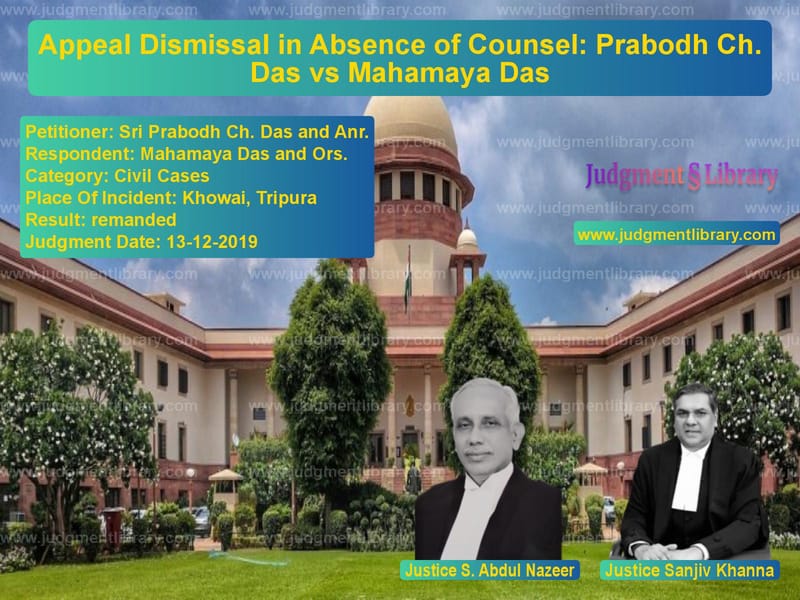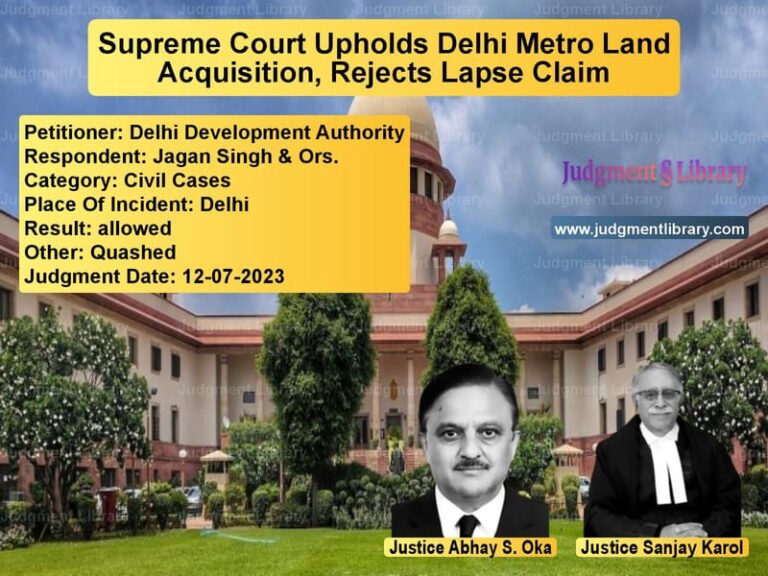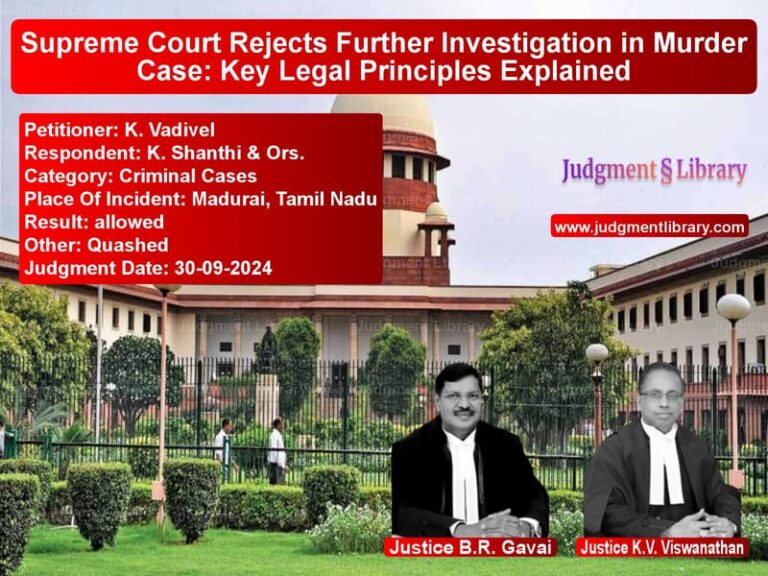Appeal Dismissal in Absence of Counsel: Prabodh Ch. Das vs Mahamaya Das
The present case involves the appellants, Sri Prabodh Ch. Das and another, who challenged the decision of the High Court in dismissing their second appeal on merits in the absence of their counsel. The issue revolves around the High Court’s exercise of discretion to decide the appeal despite the appellants’ counsel being absent, as well as the applicability of Order XLI Rule 17 of the Code of Civil Procedure (CPC) governing dismissal for default.
Key Facts of the Case:
- The appellants were defendants in a civil suit (T.S. 10 of 2000), where the plaintiffs filed for a declaration of their title, recovery of possession, and mesne profits.
- The Trial Court dismissed the suit on 19.08.2002. Aggrieved by the decision, the plaintiffs appealed to the Additional District Judge, West Tripura, Khowai, and the appeal was allowed on 30.06.2006. The District Court declared the plaintiffs as owners and granted recovery of possession.
- The appellants then filed a second appeal (R.S.A No. 45 of 2006) before the High Court, which was listed for hearing on 21.01.2015. However, the counsel for the appellants was absent, and no request for adjournment was made on their behalf. Consequently, the High Court proceeded to decide the appeal on merits and dismissed it.
- The appellants contended that the High Court erred in dismissing the appeal on merits in the absence of their counsel, relying on the provisions of Order XLI Rule 17 of the CPC, which outlines the procedure when an appellant fails to appear.
Petitioner and Respondent Arguments:
Petitioner (Appellants): The appellants argued that the High Court was not justified in proceeding to decide the appeal on merits in the absence of their counsel. They relied on the provisions of Order XLI Rule 17(1) of the CPC, which prohibits dismissing the appeal on merits when the appellant is absent. The appellants requested the matter be remitted for fresh disposal in accordance with the law.
Respondent (Mahamaya Das and others): The respondents supported the judgment of the High Court and contended that the appeal had been correctly dismissed on merits. They emphasized that the appellants’ failure to appear should not allow them to escape the decision based on merit.
Important Judge Arguments:
Justice S. Abdul Nazeer: Justice Nazeer noted that under Order XLI Rule 17(1) of the CPC, if the appellant fails to appear, the Court can dismiss the appeal for default but not on merits. The Court cannot decide the appeal on merits if the appellant is absent, as explained by the introduction of an explanation to Rule 17 in 1976. The Court found that the High Court had incorrectly proceeded to decide the appeal on merits without considering the absence of the appellants’ counsel.
Justice Sanjiv Khanna: Justice Khanna concurred with the view expressed by Justice Nazeer. He further emphasized the importance of providing an opportunity to appellants to explain the cause of their non-appearance and highlighted the error of the High Court in not adhering to the mandatory provisions of the CPC in dismissing the appeal on merits.
Legal Provisions Discussed:
- Order XLI Rule 17(1) of the CPC: This provision outlines the procedure for dismissing an appeal when the appellant does not appear on the day fixed for hearing. It explicitly states that the appeal may be dismissed for default but not on merits in the absence of the appellant.
- Explanation to Rule 17(1): The explanation, added by the CPC (Amendment) Act of 1976, clarifies that the appeal cannot be dismissed on merits if the appellant fails to appear. This amendment was introduced to resolve conflicting views held by different High Courts.
- Relevant Precedents: The judgment references the case of Abdur Rahman v. Athifa Begum (1996) and Ghanshyam Dass Gupta v. Makhan Lal (2012), where the Court reaffirmed that an appeal cannot be decided on merits when the appellant is absent, and the law mandates that the appellant be given an opportunity to present their case.
Conclusion:
The Supreme Court found that the High Court had erred in dismissing the second appeal on merits in the absence of the appellants’ counsel. The Court set aside the impugned judgment and remitted the matter to the High Court for fresh disposal in accordance with the law. The judgment highlights the importance of adhering to procedural safeguards under the CPC to ensure fair representation for appellants in civil appeals.
Final Judgment:
The appeal was allowed, and the case was remitted to the High Court for fresh consideration. The Court emphasized that no appeal should be decided on merits in the absence of the appellant, ensuring that appellants are given a fair opportunity to present their case.
Petitioner Name: Sri Prabodh Ch. Das and Anr..Respondent Name: Mahamaya Das and Ors..Judgment By: Justice S. Abdul Nazeer, Justice Sanjiv Khanna.Place Of Incident: Khowai, Tripura.Judgment Date: 13-12-2019.
Don’t miss out on the full details! Download the complete judgment in PDF format below and gain valuable insights instantly!
Download Judgment: Sri Prabodh Ch. Das vs Mahamaya Das and Ors Supreme Court of India Judgment Dated 13-12-2019.pdf
Direct Downlaod Judgment: Direct downlaod this Judgment
See all petitions in Contract Disputes
See all petitions in Landlord-Tenant Disputes
See all petitions in Damages and Compensation
See all petitions in Other Cases
See all petitions in Judgment by S. Abdul Nazeer
See all petitions in Judgment by Sanjiv Khanna
See all petitions in Remanded
See all petitions in supreme court of India judgments December 2019
See all petitions in 2019 judgments
See all posts in Civil Cases Category
See all allowed petitions in Civil Cases Category
See all Dismissed petitions in Civil Cases Category
See all partially allowed petitions in Civil Cases Category







